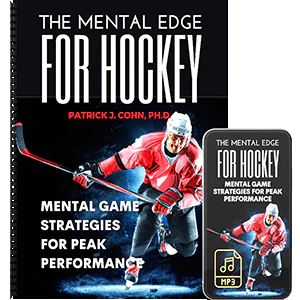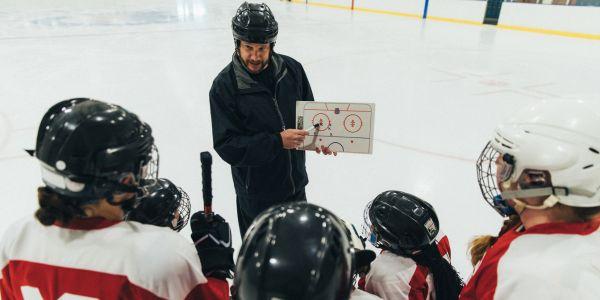Does Practice Make Perfect?
Since “perfect” is an unrealistic ideal, the answer is no.
However, practice goes far beyond perfecting technique. Practice creates habits.
Practice hones your technical and tactical awareness. Practice improves conditioning, speed, agility, and power.
Practice improves communication, builds team cohesion, and sets a team’s culture.
Practice improves confidence, resilience, motivation, and competitiveness.
In that sense, practice offers much more than “perfect” technique; it affords the opportunity for players and teams to accomplish their goals and uncover their potential.
Yet, many players will squander those opportunities, and, to some extent, it’s understandable.
An NHL regular season is about 26 weeks. If you were to add up pre-season, practices, games, skate-arounds, and conditioning, an NHL player spends more than 450 hours on the ice during the season.
In a three-hour practice, there is a temptation or tendency to hold back early in the session or back off towards the end of practice. All of which prevent you from being the best hockey player you can become and lessen your potential contribution to your team.
The attitude that you can pick and choose when you will work hard in training sessions yet still be able to turn it on in games is a fallacy. Going through the motions only reinforces bad habits, making replacing those habits with positive, productive ones more challenging.
How can you Develop Positive Practice Habits?
A three-step plan can help you develop positive and productive practice habits.
1. First, break down practice into smaller components. Instead of approaching training as a three-hour session, chunking down practice into 15-minute sessions will help sustain your focus, intensity, and work ethic.
2. Next, set practice goals. Goals give practice a purpose, helping you stay motivated.
3. Lastly, evaluate your performance after practice is over. Evaluating performance gives you insight into your practice habits.
For example, if you are looking to improve your faceoffs, set a small goal of honing your faceoff skill in practice. Each rep you take, focus on winning the faceoff as if it were a game. Make sure to compete consistently during each repetition.
After training, grade your performance, recommit to your goal for the next practice, and adjust your plan if necessary.
New York Rangers defenseman K’Andre Miller has maximized his opportunities in practice to fine-tune his skills, correct mistakes from previous games, and strengthen his overall game. Miller not only focuses on positive practice habits but also goes the extra step by asking for advice from his teammates.
MILLER: “It’s always a good time after practice or maybe before practice to pull guys aside. You try to work on some of those individual things or learn some things from guys that have a little bit more skill or knowledge of something.
You’re not just shooting; you’re trying to learn different things… There’s a lot of good that comes from practice. It’s just all those extra reps and spending more time together that goes a long way.”
Each practice is an opportunity to take your game higher. Make the conscious choice to take advantage of those opportunities.
One way to develop positive practice habits is to hold yourself accountable for your thoughts and actions.
To keep yourself maximizing your opportunities, periodically ask yourself these questions throughout practice.
“What habits am I contributing to now? Am I developing habits that will help me grow my game, or will these habits hold me back from my potential?”
Remember, the goal of practice is to maximize your and your team’s potential.
Related Articles on Hockey Mental Game:
- How to Maintain your Edge in Hockey Without Formal Practice
- Hockey Players Who Practice with a Purpose
- Improve Your Hockey Skills with Smart Practice
*Subscribe to The Sports Psychology Podcast on iTunes
*Subscribe to The Sports Psychology Podcast on Spotify
The Mental Edge for Hockey

The Mental Edge for Hockey teaches you proven and simple mental game strategies so you can overcome fear of failure, lack of confidence, slumps or poor composure, take your practice game to competition, and boost your confidence in hockey. You learn simple, actionable mental game strategies to help you perform at your peak!
I’ve worked with athletes for 30 plus years – and know the top challenges that undermine performance when you perform in games. Now you can tap into my expertise and experience in coaching hockey players on the mental game.
In this program, you’ll learn the TOP 10 mental training lessons for hockey players – the same strategies I teach one-on-one athletes I coach on the mental game. My clients pay thousands of dollars for personal coaching, but now you can have the same strategies to improve your mental game – at a fraction of the price.

Leave a Reply